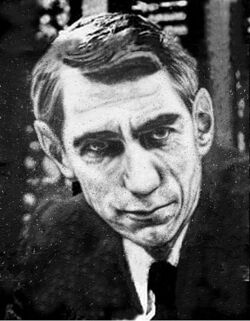Claude Shannon (nonfiction): Difference between revisions
No edit summary |
No edit summary |
||
| Line 9: | Line 9: | ||
== In the News == | == In the News == | ||
<gallery | <gallery> | ||
</gallery> | </gallery> | ||
== Fiction cross-reference == | == Fiction cross-reference == | ||
* [[Crimes against mathematical contants]] | |||
* [[Gnomon algorithm]] | |||
* [[Mathematics]] | |||
== Nonfiction cross-reference == | == Nonfiction cross-reference == | ||
| Line 18: | Line 22: | ||
* [[Information theory (nonfiction)]] | * [[Information theory (nonfiction)]] | ||
* [[Ralph Hartley (nonfiction)]] | * [[Ralph Hartley (nonfiction)]] | ||
* [[Shannon switching game (nonfiction)]] | |||
== External links == | == External links == | ||
Revision as of 17:02, 22 December 2017
Claude Elwood Shannon (April 30, 1916 – February 24, 2001) was an American mathematician, electrical engineer, and cryptographer known as "the father of information theory".
Shannon is noted for having founded information theory with a landmark paper that he published in 1948.
He is perhaps equally well known for founding digital circuit design theory in 1937, when, as a 21-year-old master's degree student at the Massachusetts Institute of Technology (MIT), he wrote his thesis demonstrating that electrical applications of Boolean algebra could construct any logical, numerical relationship.
Shannon contributed to the field of cryptanalysis for national defense during World War II, including his basic work on codebreaking and secure telecommunication.
In the News
Fiction cross-reference
Nonfiction cross-reference
External links
- Claude Shannon @ Wikipedia
